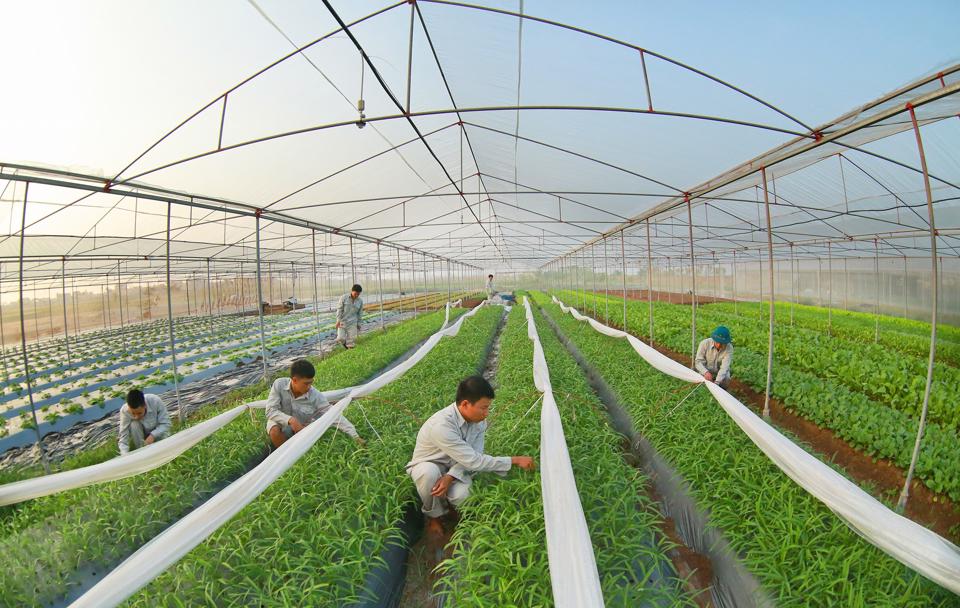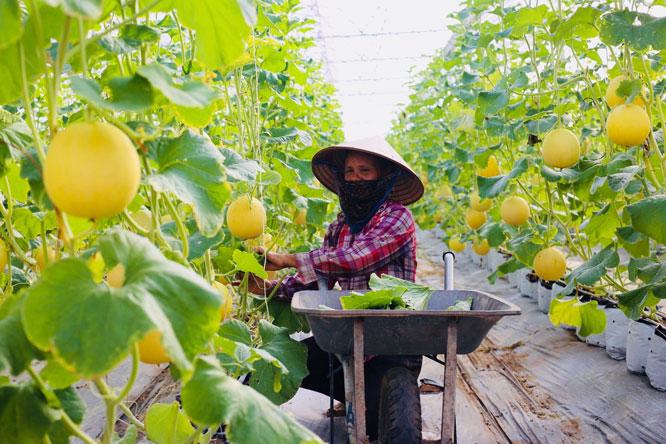Hanoi’s agricultural sector move toward green production
The adoption of green and advanced agricultural models not only results in the production of safe and hygienic food but also leads to an increase in the economic efficiency of 15-20% compared to conventional production methods, all while reducing environmental pollution.
Since 2017, Nguyen Thi Mai Hoa, owner of an herb chicken farm in Minh Phu Ward of Hanoi's Soc Son District, has taken steps to reduce environmental pollution in livestock production by adopting a microbial feed incubation model combined with the use of herbs.
| Clean farm production at Japan & Vietnam Vegetable, Fruit Company. Photo: Phuong Nga |
At present, her farm raises about 3,000 broiler chickens and sells an average of 1,000 chickens per batch every month.
"With the favorable market trend, we plan to further expand production to establish a clean and high-quality chicken brand and meet the growing demand soon," Hoa told The Hanoi Times.
Nguyen Manh Hong, director of Duc Phat High-tech Agriculture Cooperative in Thanh Tri District, said his cooperative has invested in developing a hydroponic vegetable farming model to produce green, safe and environmentally friendly agricultural products.
He said annually, the cooperative can harvest over 7 tons of various vegetables, including lettuce, broccoli, water spinach, cucumber, and more. In addition, the cooperative has also ventured into producing cantaloupe melons in a 1,000 m2 greenhouse, yielding approximately 2.4 tons and generating a profit of VND70 million ($3,000) per crop.
Hoa, Hong and many other farmers, cooperatives, and businesses in Hanoi are opting to invest in safe and technologically advanced agricultural production models. This decision is driven by the increasing demand from consumers for clean, organic, and natural food and agricultural products, which are perceived to be beneficial for both personal health and the well-being of the community.
According to Chu Phu My, former director of the Hanoi Department of Agriculture and Rural Development, the value of high-tech agricultural products in Hanoi has already reached 40% by the end of 2022.
"Looking ahead to 2025, the city aims to increase this figure to 70% of the total value of agricultural production, indicating a significant shift towards high-tech agriculture. The incorporation of advanced technology into production methods has marked a new phase for the capital's agricultural industry," My said.
My's remarks are in line with a study by the city's Department of Agriculture and Rural Development, which found that the capital's agricultural industry is committed to environmentally friendly and safe farming practices.
In this regard, many localities in the city are adopting scientific and technological advances in their agricultural production methods and promoting organic transformation to ensure consumer health.
At present, Hanoi has 164 agricultural production models using high technology, 5,000 hectares of safe vegetable production, and more than 50 hectares of organic vegetable production.
These modern agricultural models not only provide a source of clean food but also increase economic efficiency by 15-20% compared to traditional production methods while reducing environmental pollution, the report said.
These facts demonstrate the dual benefits of environmentally friendly production practices for both agricultural production and the environment, it added.
| Cultivating cantaloupes at the Chuc Son Clean Vegetable Cooperative (Chuong My District) brings high economic efficiency. Photo: Ngoc Anh |
Expanding green models
However, it is worth noting that developing green and safe agricultural models that prioritize environmental protection often involves high costs, and the selling price of safe farm products may still be unstable.
To overcome these challenges and expand the use of green agricultural models, Nguyen Van Chu, general director of Organic Green Clean Food Co. in Thuong Tin District, called on authorities to support cooperatives and farms by facilitating loans with preferential interest rates for the application of high technology in safe agricultural production.
"These measures will encourage the adoption of production methods according to VietGAP [Vietnamese Good Agricultural Practices] standards," Chu said.
Vice Chairman of the Thach That District People's Committee Nguyen Kim Loan said that in line with modern farming methods, the district would promote sustainable agricultural production models, restructure plant and animal production to adapt to climate change, and strictly regulate the distribution and use of pesticides.
"We will prioritize livestock and aquaculture development based on established planning and replicate farming, breeding, and aquaculture models that comply with VietGAP standards," Loan said.
On a larger scale, the deputy director of the Hanoi Department of Agriculture and Rural Development noted that the city is prioritizing the development of environmentally friendly and green agriculture by investing in production infrastructure and building strong brands for commodity farming areas.
To aid this process, Phuong said the agency is working to promote the replication of safe agricultural models while implementing effective management and environmental protection measures.
"This involves coordinating with other sectors and localities to share innovative methods and good practices for sustainable agriculture. Hanoi is also creating favorable conditions for businesses to invest in green agriculture and develop high-tech agricultural models," Phuong added.
In addition, Phuong expected the agricultural sector to work with local governments to promote the adoption of scientific and technological advances in agricultural production.
"There is a mechanism to strengthen the management, supervision, and implementation of a master plan to ensure targeted and sustainable industrial development, where production growth and environmental protection go hand in hand," Phuong said.
In addition, each locality should help farmers manage the packaging of pesticides and fertilizers in the field, use biological products to treat livestock waste, and disseminate legal documents on environmental protection in agriculture.
"It is the authorities' responsibility to raise awareness of each citizen's role and responsibilities in protecting the environment during agricultural production," Phuong said.














